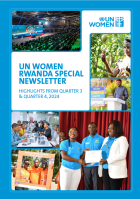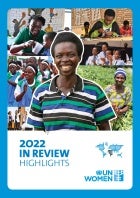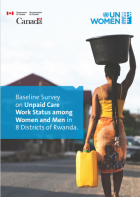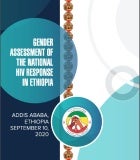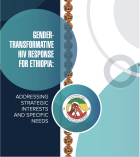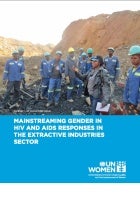1 - 18 of 18 Results
Date:
This newsletter highlights some of UN Women`s key milestones made in advancing gender equality and women`s empowerment in Rwanda in the period of July - December 2024
Date:
UN Women Zimbabwe and NAC studied high HIV incidence among adolescent girls and young women (AGYW) in Matabeleland South. The research identified key risk factors, including limited HIV awareness, economic vulnerability, and gender inequality. It highlighted service gaps and recommended targeted interventions. A holistic approach combining education, economic empowerment, and gender-sensitive programs is essential to reducing HIV incidence and improving AGYW’s well-being in the province.
Date:
This brief emerges from the Country Gender Equality Profile (CGEP), which captures the country’s gender equality and women empowerment (GEWE) situation across Kenya’s diverse areas and contexts.
Date:
The publication comprehensively analyzes the country’s gender equality and women empowerment (GEWE) situation across Kenya’s diverse areas and contexts.
Date:
The 2022 in review yearly edition aims at keeping our esteemed readers abreast with the endeavors of the UN Women Rwanda programmatic highlights and achievements throughout the year. It encompasses the period of January through December 2022. Within these pages, we have meticulously curated a selection of activities undertaken by our organization, as well as providing a platform for the voices of those whom we have had the privilege of serving, to be heard. We trust that the contents of this newsletter will prove to be both enlightening and informative. Enjoy the read!
Date:
This edition of our quarterly publication, aimed at keeping our esteemed readers abreast with the endeavors of UN Women Uganda, encompasses the period of October through December 2022. Within these pages, we have meticulously curated a selection of activities undertaken by our organization, as well as providing a platform for the voices of those whom we have had the privilege of serving, to be heard. We trust that the contents of this newsletter will prove to be both enlightening and informative. Enjoy the read!
Date:
This quarterly newsletter profiles UN Women Uganda activities and highlights voices of beneficiaries. The Q3 Newsletter covers the period of July to September 2022.
Enjoy the read!
Date:
This quarterly newsletter profiles UN Women Uganda activities and highlights voices of beneficiaries. The Q3 Newsletter covers the period of July to September 2022.
Enjoy the read!
Date:
The baseline survey on unpaid care work status among women and men in eight districts of Rwanda seeks to understand the care-related dynamics in households, this study utilized both quantitative and qualitative research methodologies. Drawing on Oxfam’s Household Care Survey (HCS) and the Harvard Analytical Framework (also referred to as the Gender Roles Framework). The survey helps to understand how women, men and children spend their time, how care activities are distributed in the household and the access that households have to basic public services and infrastructure that facilitate their everyday survival. The study also explored the social norms that shape power relations and gender division of care labor.
Date:
The Annual Report captures the work of UN Women in Zimbabwe to accelerate Gender Equality and Women's Empowerment in Zimbabwe. It highlights the organisation's initiatives, challenges and milestones achieved in 2021.
Date:
UN Women amplified women’s role in the COVID-19 response highlighting the significant leadership roles women played in leading the response efforts in materials on COVID-19 prevention disseminated in local languages and hand washing facilities were constructed in 6 elementary schools. 528 returnee migrant women workers from the Middle East and domestic workers across Addis Ababa have been provided with basic sanitation and hygiene training and raising awareness on the disproportionate impact of COVID-19 on women, girls, and vulnerable and marginalized groups.
Date:
The review indicated that Ethiopia has not only ratified many of the conventions and treaties related to refugees and asylum seekers, but also formalized these laws into its Constitution and in the national Refugee Proclamation. However, a closer analysis of the health sector focusing on sexual, reproductive, maternal, newborn, child and adolescent health (SRMNCAH) services to women and girls in the humanitarian settings, the laws, policies, strategies, guidelines, programs, and plans of the sector indicated a clear gap.
Date:
Gender inequality and the failure to recognize and defend women’s human rights are realities of the daily lives of women. In many circumstances, women and girls face the most oppressive: gender inequality and unequal power relations at household and intimate relationship levels. The socio-cultural and economic factors driving the HIV epidemic have gender dimensions that are also built in the same power relations which segregate the differences in the roles and responsibilities of men/women and boys/girls.
Date:
This gender assessment was conducted to analyze the national HIV epidemic and its contexts and evaluate the degree to which the country’s response to HIV recognizes gender and its associated inequalities as key determinants of the epidemic.
Date:
UN Women Eastern and Southern Africa Regional newsletter of April 2016 The highlights of this issue: Transformational Leadership Training Equips Ethiopian Women to Transform Institutions:The Story of Mrs. Fikre Mulugeta of Ahmara Regional Council Uganda agrees on Gender Statistics to accelerate Sustainable Development Goals Implementation UN Women and Africa UNiTE Launch “Violence Thrives in our Silence” Documentary The Time is NOW: High Level Panel on...
Date:
The highlights of this issue : The opening Session of the Commission - Priority theme-Key messages - Agreed Conclusions of CSW 60 on the priority theme - Family and gender equality - The role of the UN System & UN Women - Challenges and concerns - The review theme–The elimination and prevention of all forms of violence against women and girls - Commission’s new resolution on “Women, the girl child and HIV and AIDS”.Looking forward & planning aheadAcknowledgements
Date:
The highlights of this month• Africa must rise with and through women, says UN Women Executive Director• UN Women Launches Guide For Gender-Responsive HIV and AIDS Programming in the Extractive Industry• Commonwealth meeting recommends having more women in top positions• A Women’s Investment Fund - New Faces New Voices in Rwanda• UN Women and the Green Belt Movement (GBM) join the world in marking the World Environment Day• …
Date:
As part of this program UN Women have an ongoing initiative examining the gender dimensions of HIV and AIDS as they intersect with the extractive industries. This initiative has involved desk research and consultations with industry representatives, and has resulted in a two-part publication. The first part of the publication is a contextual background report, which examines the links between gender, HIV and AIDS and the extractive industries in more depth, including full citations and methodological information about the research process.

